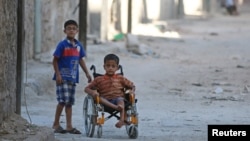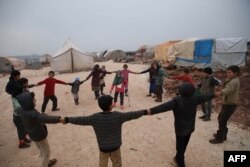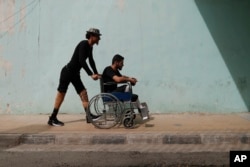Sham al-Akhras, 10, has only known war since the Syrian civil war started in March 2011, when she was an infant. If the brutal conflict is physically and emotionally distressing for regular Syrians, it is all the more so for al-Akhras, who has to live with her disability under the harsh conditions of a refugee camp in northern Syria's Idlib.
Al-Akhras is unable to speak and can barely walk. Her father, Maher, told VOA that lack of access to medical facilities in Idlib's war zone has prevented him from even diagnosing her condition, let alone getting proper treatment.
But despite the great barriers, al-Akhras has turned into a strong little girl, determined to fully live her childhood moments of carefree play and uncontrollable giggles.
"She is an independent and a brave little soul," Maher said. "Sham does not allow us to help her in her daily life, like helping her stand up, put on her clothes or eat. She likes to do things by herself."
Al-Akhras and her parents were displaced from Aleppo when the war escalated between the Syrian regime and rebels in 2012. They are settled in a refugee camp in Harem town near the Turkish border, where al-Akhras is enrolled in the first grade at the camp school.
Despite a lack of special accommodations for her at the school building, she insists on going there to learn the Arabic alphabet and work on coloring, shapes and other educational activities.
"The displacement was harsh on Sham. We left Aleppo because of the violence that took over our city. We lost our house in an airstrike by the regime. We are facing financial hardships; and adding to all this is the absence of professional medical aid and treatment because of the war that has made it harder for us to find good care for our daughter," al-Akhras' father said.
With no real end in sight to the war in Syria, al-Akhras is only one among thousands of disabled Syrians who have to carry the heavy burden of the conflict, according to rights organizations and experts following the plight of disabled Syrians.
Stigma and exclusion
Fayez Orabi, a Syrian doctor operating from Turkey, told VOA that many disabled Syrians also are suffering from stigma and exclusion within their communities, in addition to the effects of the war. He said neglect and lack of psychological help most likely would leave permanent psychological scars, especially on those who became impaired by the war.
"People who were disabled by the war suddenly find themselves unable to interact with their communities and can't earn a living for their families. This adds a sense of guilt and shame in them because they have lost their abilities to be active like they used to be," Orabi said.
Orabi said that disabled Syrians, facing an overwhelmingly unfavorable attitude, have almost no chance of getting into the work force to become productive members in their communities and breadwinners for their families.
"When a family member is disabled, especially when this person is the main provider to the family, the entire family is affected. Providing people with disabilities with an opportunity to be productive will support the entire family," Orabi said.
Millions displaced
According to the Syrian Observatory for Human Rights, the British-based war monitor, the Syrian civil war has cost the country about 560,000 lives with millions of people displaced.
The United Nations International Children's Emergency Fund (UNICEF) said Monday that about 1.5 million people in Syria are now living with permanent impairments because of the conflict, including 86,000 people who have lost limbs. It estimated 3.3 million Syrian children are exposed to risks from explosive hazards such as land mines.
The agency said children with disabilities were particularly exposed to the devastation of war, and it asked aid organizations to help provide access to aids like wheelchairs, canes and prosthetics.
"In conflict, children with disabilities are among the most vulnerable," said Geert Cappelaere, UNICEF's Middle East and North Africa regional director. "They often require specialized treatment and services. As children, their needs differ from those of adults. Without access to services, schools and assistive products like wheelchairs, many children with disabilities face a very real risk of exclusion, neglect and stigmatization as the unrelenting conflict continues."
Local activists in many areas have introduced initiatives to support people with disabilities by providing them with medical treatment and reintegrating them into the society. They say international aid is helpful but not enough — and a change of attitude is needed in the society to address the problem.
Hassan Hamzeh, an activist working for the rights of persons with disabilities in Idlib, said effective assistance should ensure that disabled Syrians are empowered to serve as active citizens without feeling shame because of their conditions.
Hamzeh worked with other local activists to start a school for children with disabilities in Idlib, though he notes their initiative has remained local and limited because of the lack of money and support.
"Helping people with disabilities to be self-sufficient and independent in life will pave the way for them to be active members in the Syrian society that needs every contribution to rebuild the country," Hamzeh said.
VOA Extremism Watch Desk's Sirwan Kajjo and VOA Turkish, Urdu and Kurdish services contributed to this report.






